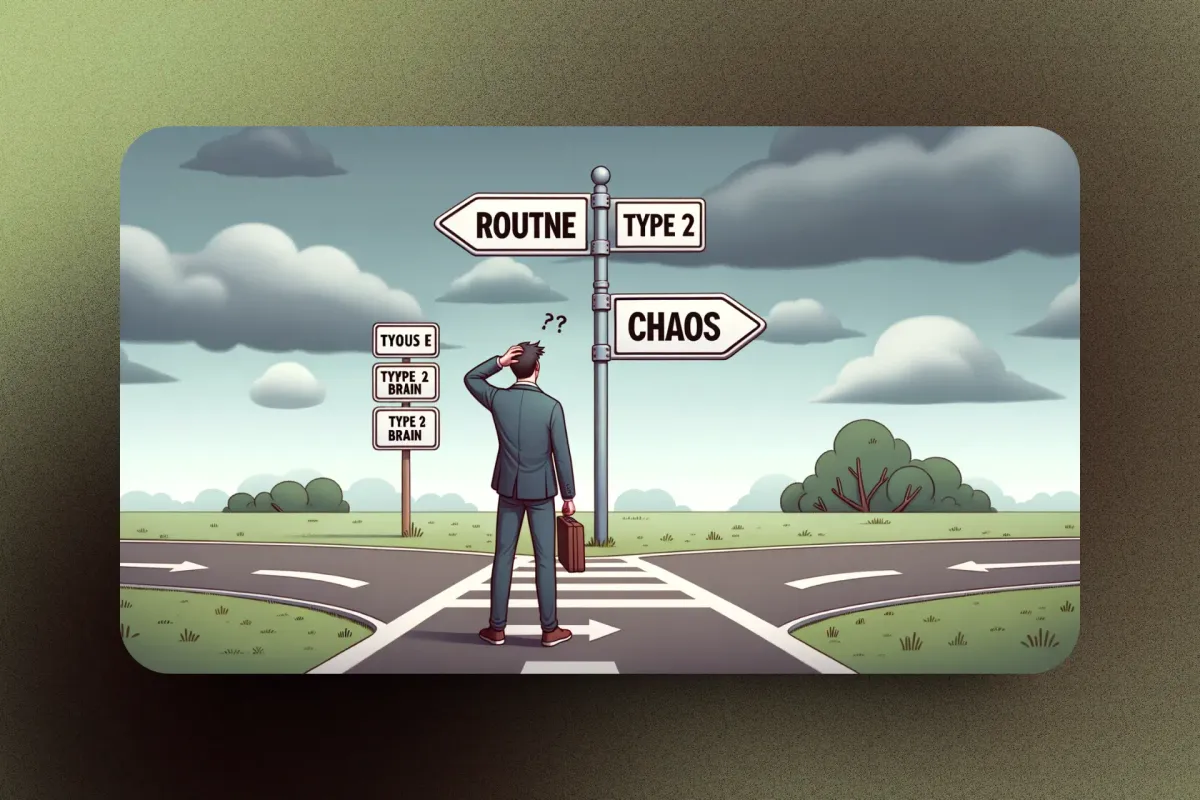Harnessing the Power of Passion: Succeeding with a Chaotic Brain

Do you feel frustrated trying to stick to habits and routines? Does your motivation seem to come in bursts of obsessive energy rather than steady discipline? You may have a "Type 2" chaotic brain.
In this post, I'll share how I've learned to work with my own frenetic mind. You'll learn:
- Why consistency and habits can backfire for some personality types
- How to prime your brain for passionate focus
- Strategies to catch up after falling behind
- Why rigid schedules kill motivation
- How to have honest conversations with your inner procrastinator
Let's dive in!
Consistency Isn't for Everyone

Atomic habits. The slight edge. The compound effect. So many self-help books preach the power of small, consistent improvements overtime. But what if your brain just doesn't work that way?
I've never been able to stick to habits or routines. My motivation comes in passionate waves - obsessive sprints of focus followed by long breaks. I'll study nonstop for 16 hours, then not touch the topic for months.
For the longest time, I thought something was wrong with me. Why couldn't I be steady and disciplined like all those productivity gurus? But over time, I've come to accept my "Type 2" brain.
Consistent habits are powerful, but not the only path. Your personality may thrive on freedom and variety rather than routine. You shouldn't force yourself into someone else's system.
The Pitfalls of Rigid Routines

In school, I was a classic high-achiever but a total organizational mess. I never knew my schedule or did assignments on time. But my grades excelled because I'd obsessively soak up material in bursts.
This "fall behind, catch up, leap ahead" approach worked well. But as an adult, I became discouraged when I stopped doing activities for periods. I felt like a failure for not sticking to consistent habits.
In reality, falling behind is normal for chaotic brains. The problem is our story that this means we've quit completely. But pausing something temporarily doesn't mean giving up forever.
Rigid routines also kill motivation. If you force yourself to do an activity consistently when you aren't feeling it, you start to resent it. Variety and flexibility keeps passion alive.
The myth of "1% daily improvements" compounds this issue. Tiny consistent gains require steady habits. But going from novice to pro in a short burst of intense focus is equally valid.
Priming Your Brain for Passion
The key with a chaotic brain is leaning into variety and intermittent intense effort. Make the most of motivation when you have it! Here are some tips:
- Prime your brain by gathering inspiration. Follow creators in the skill you want to learn. Consume content related to it. Allow anticipation to build.
- When you can't stand waiting anymore, dive in headfirst. Immerse yourself in deep focus for hours or days. Learn exponentially more than 1% better.
- After an intense learning sprint, take a complete break. Shift focus to something totally different. Avoid burnout.
- Return when motivation inevitably strikes again. Repeat the cycle of priming, passionate focus, and recovery.
This pattern leverages your brain's craving for novelty and intense interest. You capitalize on motivation when it strikes rather than forcing yourself to plod along every day.
Strategic Slacking
Another key is giving yourself permission to slack strategically. As an adult, I've realized that I work in bursts of deep focus. I need to balance this with rejuvenating play and rest.
When motivation lags, I don't beat myself up. I accept that my brain needs a break. Forcing myself to work when drained is counterproductive.
That said, I'm mindful about how I take breaks. Endless scrolling or binge watching leads to guilt. Instead, I give myself permission to indulge curiosity. I might learn piano, research obscure history topics, or paint.
This satisfies my brain's thirst for novelty while avoiding passive time wasters that leave me feeling empty. The key is being intentional about how you slack.
Catching Up Doesn't Take Forever
When you've fallen behind on a goal, it's easy to feel hopelessly paralyzed. But large gaps can be bridged with focused effort, especially if you combine:
- Renewed motivation and anticipation
- Eliminating distractions
- Immersive, energized focus
- Optimal learning techniques like interleaving and recall
With a blank slate and intense effort, you can rapidly progress. Don't assume catching up requires months or years of incremental work. Exponential learning is possible.
For instance, after months away from Spanish, I recently spent three days immersed in flashcards, videos, and conversations. I'm shocked by how fast vocabulary and grammar came back. Past progress wasn't lost forever.
Have Adult Conversations with Yourself

Finally, notice when inner dialogues turn childish. "I just don't feel like it" or "I'm too lazy" stop insight. Instead, be gently curious:
- What feelings am I labeling as laziness? (Anxiety? Insecurity? Lack of motivation?)
- What needs am I seeking to meet right now? (Rest? Fun? Connection?)
- How could I meet those needs through action vs avoidance?
Have an honest dialogue about what you're craving rather than scolding yourself. Work with yourself, not against.
The Bottom Line
Stop forcing yourself into rigid habits and structures not suited for your personality. Accept and harness the power of your chaotic motivation surges and intervals of slack. By working in sync with your true nature, you can succeed wildly - just not conventionally.
Here are some key principles:
- Passion comes in waves. Capitalize on it fully when it strikes.
- Falling behind isn't failure. You'll catch up when motivation returns.
- Take intentional, rejuvenating breaks. Don't mistake slack for quitting.
- Catch-up sprints can bridge large gaps. Past progress isn't lost forever.
- Treat yourself with compassion, not judgment. Understand your needs.
Chaotic consistency may seem like an oxymoron but it's achievable. By embracing flexibility and passion, you can thrive without rigid habits. Give yourself permission to succeed in your own unconventional style.




